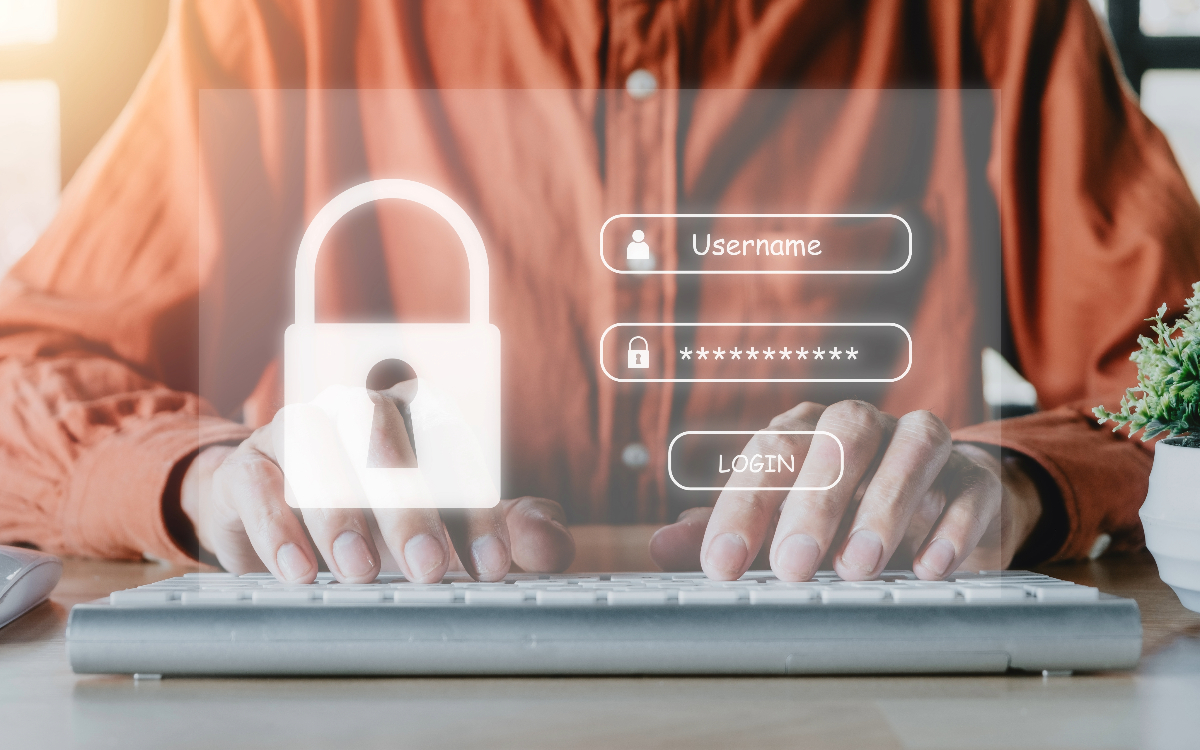With Cybersecurity Month 2023 underway, we want to highlight the importance of password managers. Memorizing dozens of unique passwords can be a headache for even the most tech-savvy person. That’s led to people cutting corners, like reusing passwords, which can be risky for users and businesses alike. With over 80% of confirmed breaches linked to password security, it’s an often understated risk. Luckily, password managers are a simple solution to that issue.
Table of Contents
How Do Password Managers Work?
Types of Password Managers: Local vs Cloud-Based
How Secure Are Password Managers?
Using the Same Password Everywhere Is Risky
Less Secure Forms of Password Management
Are There Any Drawbacks to Password Managers?
How to Choose the Right Password Manager for You
The Bottom Line: How Password Managers Protect You
What Is a Password Manager?
A password manager is a tool to store and manage your login information securely. Instead of needing to remember a multitude of different usernames and passwords, it keeps track of them all in one secure vault. Due to that, you only need to remember one strong master password to unlock access to accounts. Doing this lets you easily maintain complex passwords for your online accounts, enhancing your overall cybersecurity.
How Do Password Managers Work?
Password managers work by encrypting and securely storing your login information. When you log into a website or app for the first time, the password manager prompts you to save that info. When you visit that website or app again later, it can automatically fill in the login fields. That makes the process quick and easy and removes the need to memorize each password. With one in three Americans using a password manager, while usage has grown over the past five years, there is still a lot of room for growth.
Types of Password Managers: Local vs Cloud-Based
When considering a password manager, one of the key decisions you’ll need to make is whether to opt for a local or cloud-based solution. Both have advantages and drawbacks; understanding these can help you make a more informed choice.
Local Password Managers
Data Storage: Local password managers store your encrypted password database on your personal or work device.
Security: These managers are very secure, as the data never leaves your device unless you back it up elsewhere.
Access: You can only access your passwords from the device where the local password manager is installed, which can be limiting.
Backup: It’s your responsibility to back up your password database, and failure to do so could result in lost passwords if your device is compromised or crashes.
Updates: Local managers may not update as frequently, which could be a security concern.
Cloud-Based Password Managers
Data Storage: These managers store your encrypted passwords in the cloud, allowing you to access them from multiple devices.
Security: Reputable cloud-based solutions use strong encryption and may offer additional security features like two-factor authentication (2FA).
Access: Easy access from any device connected to the Internet makes cloud-based options more convenient for those who use multiple devices.
Backup: Your data is automatically backed up, reducing the risk of loss.
Updates: Cloud-based options often receive regular updates, enhancing security and adding new features.
Local password managers offer great security and total control over your data but are less convenient. On the other hand, cloud-based managers provide ease of use and automatic backups but require more trust in the provider’s cloud security. Choose the type that best aligns with your own needs and comfort level.
How Secure Are Password Managers?
Password managers offer a high level of security for storing and managing login information, but it’s natural to wonder just how safe they are. Put simply, they use encryption to turn your passwords into unreadable text. That means even if a hacker can view your online activity, they won’t be able to decode it without the master password.
Many password managers also offer multi-factor authentication (MFA) to add an extra layer of protection. That makes accessing your vault require a master password and a second method, such as a simple code sent to your phone via text. Always use a password manager with a positive reputation and a proven record of keeping accounts safe. While there are free options, weigh the pros and cons of the one you pick.
Using the Same Password Everywhere Is Risky
Many people use the same password or slight variations of it across multiple sites. That makes it much easier to remember but leaves people more at risk. If one account gets its password stolen, every other account with the same one is also vulnerable. With around 52% of people reusing passwords for more than one account, it’s still a widespread challenge.
Less Secure Forms of Password Management
Even for those who don’t reuse their passwords, there are other forms of password management that are less secure than people may realize. Some of those include:
Writing Down Passwords: A written password is only as safe as how it’s stored. If someone can physically access the building, then that information can easily be stolen if it’s sitting on a desk or in a unlocked drawer.
Storing in a Digital File: Some people keep a Word document or spreadsheet with all their passwords. This is risky because if your computer gets compromised, so do all your passwords.
Using Built-in Web Browser Password Saving: Browsers like Chrome and Firefox offer to save your passwords. While convenient, they often lack the advanced encryption and security features that specialized password managers offer.
Text Messages or Emails: Sending passwords through SMS or email is not entirely secure. If someone gains access to your email or phone, they can easily access your passwords.
Memory: Relying solely on your memory often leads to using simple or repetitive passwords because they’re easier to remember. That makes them less secure by default.
Sharing with Trusted Individuals: Some people share passwords with family or close friends. Other people may not use the same caution when handling passwords.
Password Hint Lists: Creating a list of hints rather than the passwords themselves might seem clever, but your accounts are at risk if anyone recognizes the pattern.
Are There Any Drawbacks to Password Managers?
While password managers are great for security and convenience, one of the main concerns is all the passwords being stored in one location. If someone gains access to your master password and can access your vault, they’ll have a way into all your accounts. Luckily, multi-factor authentication (MFA) can help remove that risk. Once set up, it requires a second layer to log in in addition to the password, such as a code sent via text to your phone.
How to Choose the Right Password Manager for You
Choosing the right password manager is a critical decision that impacts both your online security and daily convenience. Given the many options available, how do you select one tailor-made for your needs? Here are some key considerations that can guide you through the decision-making process:
1. Security Features
Look for a password manager that uses advanced encryption to protect your data. Since all of the passwords are stored in one spot, multi-factor authentication (MFA) is also essential.
2. User Experience
You’ll interact with your password manager frequently, so the user interface must be easy to use. Explore options that offer streamlined browser extensions, mobile apps, and other elements to ensure a quality experience.
3. Compatibility
Ensure the password manager you choose is compatible with your platforms and devices. Whether you’re a Windows, Mac, Android, or iOS user, it should be compatible with every device.
4. Cost
Password managers come in many pricing models; some are free, while others require a subscription. Read the features offered in each version to decide if the extra cost aligns with the added functionalities you’re looking for.
5. Backup and Recovery
Life happens, and devices get lost, or data can get corrupted. Choose a password manager with backup and recovery options to ensure you’re never locked out of your accounts.
6. Product Reviews
Product reviews can provide some extra insights. Read through both expert and customer reviews to gauge the reliability and performance of a password manager before committing to it.
7. Usability for Teams
If you’re considering a password manager for professional use, explore options that offer features tailored for teams. These may include secure ways to share passwords among team members and advanced permission settings.
By carefully weighing these aspects, you’ll be better positioned to choose a password manager that meets your unique needs. Remember, the goal is to combine convenience with security, ensuring that your online activities are both effortless and safe.
The Bottom Line: How Password Managers Protect You
A password manager is more than just a digital notebook to store passwords. It’s a secure and easy-to-use vault that makes it simple to keep track of complex passwords. With features like multi-factor authentication (MFA) and encryption, you can keep your accounts safer with little time or effort. So, as Cybersecurity Month 2023 continues, consider using a password manager if it’s not already a part of your digital routine.
Does your business need help with setting up and managing solutions like password managers? Get in touch with a consultant via our contact form or call us at +1 (800) 297-8293




